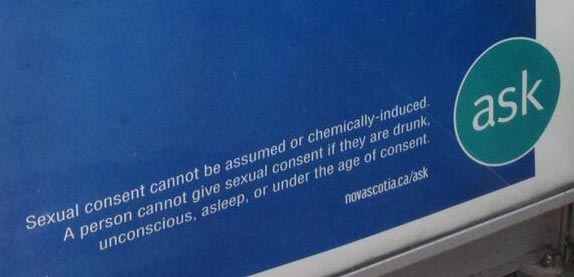HALIFAX – At first glance, they could be ads for a new night club or a swanky new product. But, in fact, they are ads sponsored by the Nova Scotia government aimed at educating young people about sexual consent.

The campaign was rolled out late last week — the first phase is transit billboards, while there are plans for a more robust online campaign and smaller poster boards in restaurants, bars and university lounges.
The government says it’s about effectively educating the public.
“People really haven’t had a lot of discussion around consent and what constitutes consent and what it means to give consent,” said Stephanie MacInnes-Langley from the Nova Scotia Advisory Council on the Status of Women. “So we really wanted this public education campaign to be about prevention and to get people talking.”
She said the campaign has been in the works for months and has gone through a myriad of focus group tests. She said the similar timing to the Rehtaeh Parsons case and controversy is only coincidence.
The ads are part of the larger “Ask” campaign which was launched on a much smaller scale in 2010. But the layout and wording of the current posters isn’t sitting well with everyone.

“I’m grateful that there’s something. It’s a start. It’s a first really,” said Sherri Bain, who has been campaigning for changes to consent education and awareness ever since Parsons’ death.

Get daily National news
She said she’s pleased something is being done, but is baffled by the way the ad is being portrayed. She said the words between the “Do” and the “Me” and the “Take” and the “Me” are simply too small for commuters to see.
She is also concerned the government is shying away from an actual political discussion about the importance of consent and the law, in favour of the more populist conversations about cyberbullying.
“We need to break the silence,” she said. “We cannot fix what we don’t acknowledge. And we’ve just not been talking about sexual violence in this province.”
Bain has launched a petition to have all the parties build consent issues into their platform. She is also pushing to have all of them ask that consent be investigated as part of the ongoing review into the actions of police and prosecution in the initial Parsons investigation.
In the meantime, if the ads are generating conversation among the public.
Michelle Murray said she likes the “edginess” of the poster.
“It’s in your face and it’s what catches people’s attention and I like the whole point of it. It’s women that need to be heard and it is a crime, so I like it.”
Dave Langille said the layout causes him concern.
“I just thought that some people might only see the ‘Do Me’ part of the message,” he said. “But with everything going on in the media today, it’s good for people to talk about, I guess.”
The campaign will run for the next four weeks.







Comments